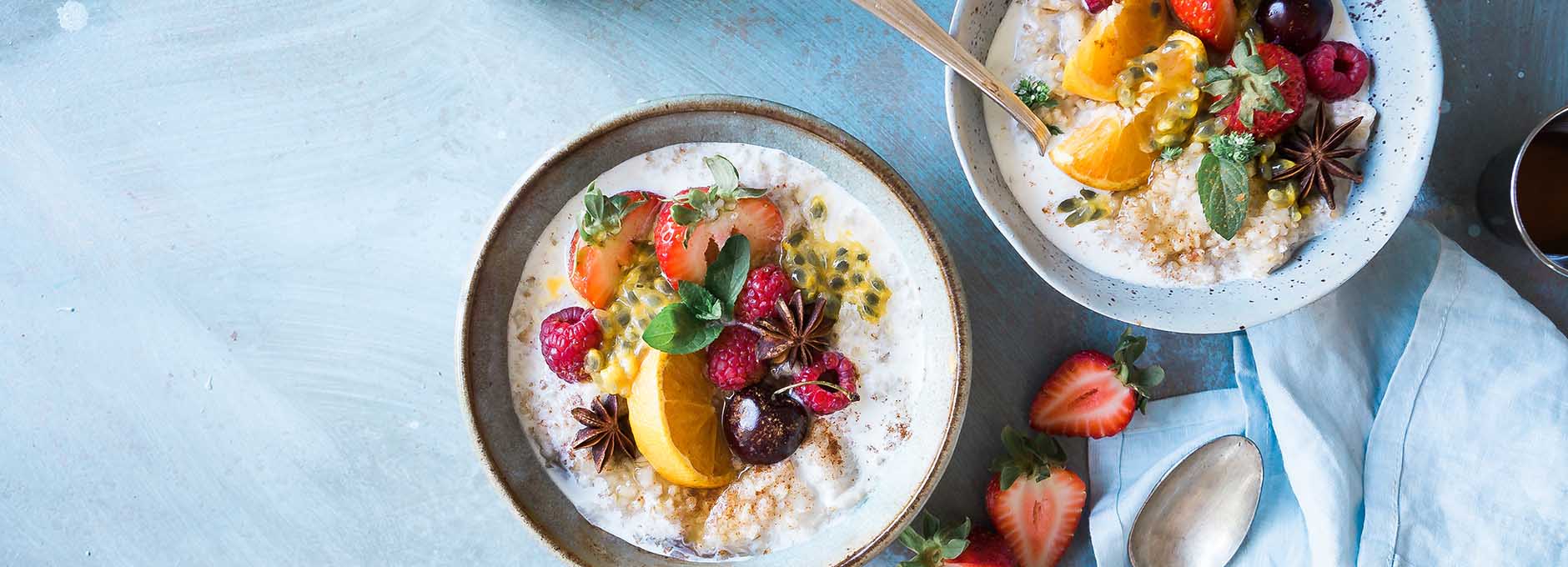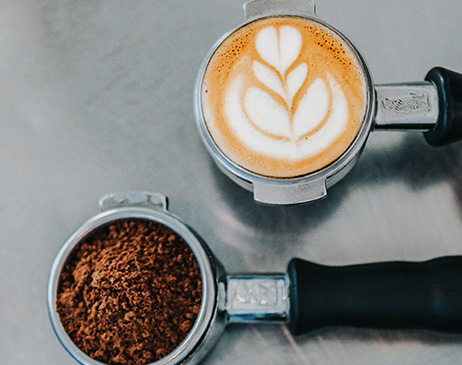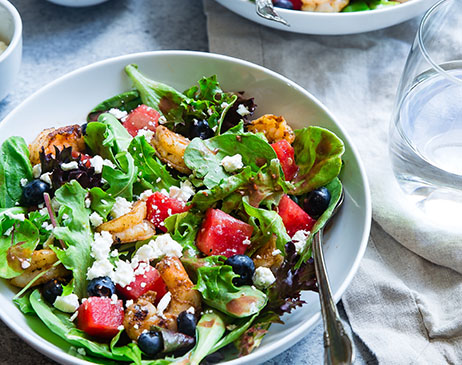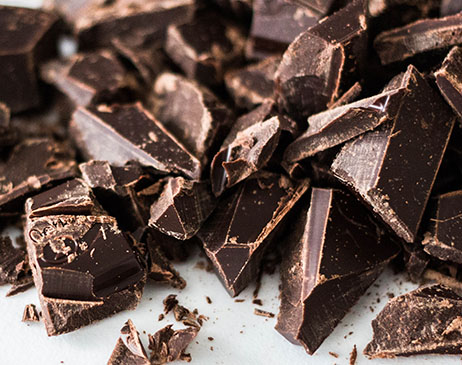Hunger Suppression Tips: How to Reduce Appetite
Hunger Suppression Tips
How to Reduce Appetite

When it comes to reducing appetite and suppressing hunger, science gives us a lot of answers. If weight loss is your goal, you’ll need to be in a calorie deficit. However, feelings of hunger when being on a diet can make this difficult.
The good news is, there are plenty of ways to lose weight – and keep it off – without having to feel hungry all the time. Here are some ways to reduce your appetite, proven by science.
1.Drink more water
Many of us are guilty of not drinking enough water in a day. The recommended amount is 6-8 glasses,1 but this may need to be increased due to factors like exercise.
One study conducted2 proved that drinking more water not only reduces appetite, but aids in overall fat loss as well.
More than that, drinking a large glass of water before a meal (up to 30 minutes before) has been shown to help a person feel fuller quicker and less hungry after finishing.3 Plus, drinking water while you’re eating can help you eat a bit less, as you’ll fill up faster.
Of course, water should never be used as a meal replacement. But, it can help curb your appetite and stop you feeling so hungry. Feelings of hunger can cause us to overeat, sabotaging weight loss efforts, so it’s a win-win.
2. Eat enough protein
If you’re following a diet, you’ll likely have heard about the significance of eating protein. But, it’s not just for bodybuilders. Protein is highly satiating, much more so than other foods, such as carbohydrates.4 Also, it reduces your levels of ghrelin, aptly named the ‘hunger hormone’.5 This can help you control your appetite more easily.
In short: you can feel fuller on less food.
Some options of good protein include lean meats like turkey or chicken, fish, soy products, eggs or beans and peas. Greek yoghurt and cottage cheese are also ideal choices.
If the suppression of appetite wasn’t enough, protein can also help boost your metabolism. This is because your body uses energy to digest food, known as thermic effect, although not all food was created equal. Protein has a much higher thermic effect than carbs or fat (20-35% compared to 5-15%).6
This, in turn, increases the number of calories you burn, giving your metabolism a boost along the way.
3. Drink coffee
While not for everyone, increasing your intake of coffee can be beneficial when it comes to weight loss. This is because it decreases your appetite by increasing the release of peptide YY (PYY), known for increasing satiety and promoting a feeling of fullness.7
Even decaffeinated coffee can be a good idea, shown to be the most effective in reducing hunger, for up to three hours after consumption.8 This is good news for those trying to cut down on caffeine!

4. Increase fiber intake
Fiber-rich foods stay in the body for longer, as they don’t break down like others. The result? You can stay feeling fuller for a greater period of time as digestion is slower.9
Some of your options include whole grains, vegetables, fruits such as pears, beans and pulses or avocados. The good news is there’s plenty to choose from here, so load up your plate and reap the benefits!
5. Go for satiating snacks
A liquid option, such as a healthy juice, may contain the same amount of calories as a piece of fruit, but might not fill you up as much. This is because the act of chewing is not only satisfying, but also slows your eating down, helping you feel fuller. This is due to the fact that it gives more time for the fullness signal to reach the brain.10
6. Make homemade soup
Are you a fan of meal prep for weight loss? Soup is a good choice, and can be made in bulk.
It can also help you lose weight and fill up more quickly. It has a low calorie density compared to its serving size, allowing you to eat more for less.
Be careful to avoid high-sugar options. It’s best to go for homemade, filling vegetable types.11 Another bonus, this is an easy way to get your 5 a day in, essential for healthy eating.

7. Eat high volume, low calorie foods
Remember: dieting isn’t about going hungry, it’s about eating right. Go for high-volume, low-calorie foods, such as fruits and vegetables.
These can help you avoid the hunger pangs and stomach growling, while ensuring you don’t choose to over-eat on high-calories, high-sugar options.
8. Get enough sleep
If you think the amount of time you sleep isn’t related to how much you eat, think again. It can cause you to look to pep your energy levels up by reaching for the nearest high-sugar option. You may also have less willpower to fight any cravings.
9. Reduce stress levels
While this can be easier said than done, feelings of stress won’t help you in your mission to lose weight.
It can cause you to comfort eat, reaching for less-nutritious, calorie-dense foods – and more of them. Reduce stress by:
- Connecting with people
- Spending time relaxing
- Accepting the things you can’t change
- Exercising more frequently
- Avoiding unhealthy habits, such as alcohol or smoking, as a coping mechanism12
10. Eat spicy foods
Spicy food, such as cayenne pepper, has been shown to reduce appetite.13 Spicy food has other benefits when it comes to weight loss too. Capsaicin increases your core temperature, therefore boosting metabolism and helping you burn calories faster.14
11. Be mindful when eating
Your body has natural signals that tell you when you’re full. However, eating too quickly or being distracted while you eat can make these less effective, causing you to eat more than you need to.
The solution? Practicing mindful eating.
This involves:
- Distinguishing between true hunger and non-hunger e.g. boredom eating
- Only eating until you’re full
- Listening to physical hunger cues
- Eating slowly
- Appreciating your food15
12. Eat off of smaller plates
Eating on a small plate can help you unconsciously reduce portion sizes and eat less – without feeling deprived.
The more you have on your plate, the more you’re likely to eat. This also works the other way around.

13. Do more exercise
Exercise is key for losing weight, and there are many beneficial types, from running to swimming to strength training. But, it’s not just beneficial for burning calories.
Exercise, particularly if done before a meal, can also reduce the activation of the brain that’s linked to food cravings.16 The result? Less desire to eat.
In turn, it also reduces hunger hormone levels, while simultaneously helping you feel fuller.
15. Practice visualisation exercises
Imagining eating your unhealthy cravings can reduce your intake of them.[1] Try practicing this next time, it might just help you eat a lot less. It decreases your cravings and tricks your mind into thinking you’ve already had them.
16. Cut down on sugar
High-sugar foods, such as milk chocolate or processed white bread, will give you energy – but it will be short-lived. After the spike in blood sugar, you’ll crash, leaving your body looking for another instant hit. This can make you feel hungrier and eat more.
Control your appetite by eating slow-release energy foods, such as whole grains.

17. Go for dark chocolate
While high in calories and fat, dark chocolate is hugely beneficial when it comes to losing weight. It has been proven to reduce cravings, promote feelings of fullness and reduce levels of ghrelin.18
It can also help curb your cravings for milk or white chocolate, which is very high in sugar
18. Don’t leave it too long between meals
Extreme feelings of hunger will decrease your motivation to stay on track and tempt you to overeat. Aim to eat at least three times a day, as this will reduce the risk of overeating and choosing unhealthy options.19
Also, aim to eat every 3-4 hours. Any longer can increase levels of hunger hormones.
19. Go nuts
While high in fat, nuts make for a great snack, helping to curb appetite.20 Even a small handful can reduce cravings for unhealthy foods.
They’re also nutrient-dense, while containing both fiber and protein, so the benefits are clear.

20. Eat more ginger
It’s an acquired taste, but incorporating some more ginger into your diet has numerous health benefits. It has also been found to help you stay fuller for longer.
It promotes weight loss by enhancing the thermic effect of food while simultaneously increasing feelings of satiety.21
Listen to your body
The key takeaway here is to be more mindful when eating, listening to your body’s cues of both hunger and fullness. It’s just as important to recognise when you’re actually hungry as when you’re not. Pay more attention to the signs and react accordingly. Remember: losing weight doesn’t mean you need to feel hungry all the time!